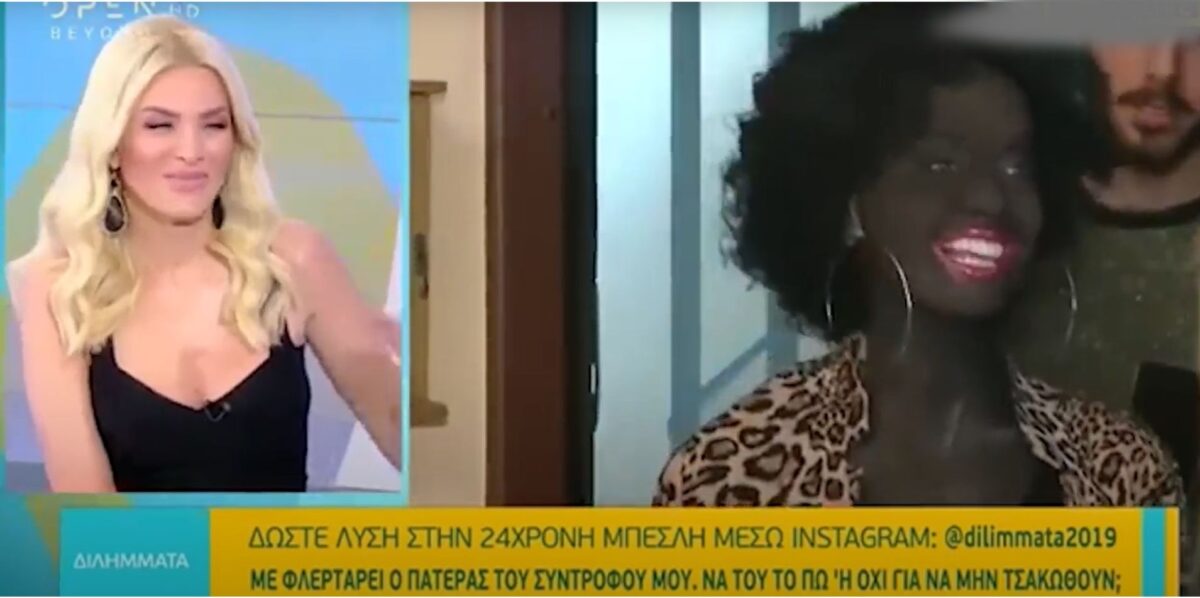The National Broadcasting Council decides on the decision on the degrading portrayal of a black woman in the show “Eftichite””

Blackface is an insult to an entire race, not a Halloween costume.
In January 2019, Generation 2.0 for Rights, Equality & Diversity together with the ANASA Cultural Centre for African Art and Cultures filed a complaint with the National Broadcasting Council regarding the racist content of the show ‘Eftichite’ aired on Open Beyond TV station, hosted by Ms. Katerina Kainourgiou. Specifically, in this programme in the section ‘Dilimata Zois’, a sketch was shown in which we saw once again the practice of blackface*.
A white actress, who played the role of a black Greek woman, a second generation child, appeared with jet black paint on her face and body, bright red lipstick, dressed in highly stereotypical clothes, such as leopard print, huge hoops and an afro wig. At the same time, the indescribable image for a human being was accompanied by the outdated stereotypical hypersexuality of the “black woman of the jungle”. We will not go into commenting on the fact that the TV sketch heroine in question referred to the country if her parents origin wrongly, intonating Mali on the second syllable. It is obvious that for this TV production team, content is of no importance.
It took five (!) whole years – with constant pestering on our part – for the National Broadcasting Council to make a decision on the subject and on 20 June 2024 we received the decision imposing a fine of €15,000 on the Open Beyond TV station for broadcasting a “qualitatively substandard television programme”. At no point does the National Broadcasting Council recognise the practice of blackface as racist, despite the fact that it offends the dignity of a group of people on the basis of racial characteristics and despite the fact that this phenomenon continues, even today, to play a significant role in spreading racist attitudes and behaviour towards black people worldwide.
In more detail, the National Broadcasting Council notes that “face disguise with black paint, in Greece, is not linked to racist phenomena, but to carnival costumes, within the framework of the carnival celebrations”. So, in essence, it is not condemning the practice of blackface, but what? That it wasn’t successful enough? It wasn’t a high enough quality Halloween costume? Since, as the host Katerina Katerina Kainourgiou pointed out on the show, laughing spontaneously, they didn’t have time to find a black actress, so they painted theirs “with a jet black paint” and the result was, if anything, funny… What does “low quality program” mean? Does it mean misinforming the public by calling Mali with wrong intonation?
The recognition and condemnation of blackface as a racist practice in our country is necessary, as it signals the rejection of practices of hatred and oppression of an entire race and is part of a broader effort to combat racism and promote equality and respect for all races and cultures. The National Broadcasting Council’s decision does not fully vindicate either the people of African descent living in our country who are offended, or a society that seeks to be fair and open.
And we honestly wonder, how difficult is it for a person, a service, an Authority to understand something so simple and clear? How can such a degrading, racist practice be equated with the frivolity of Halloween? And why, after all, even if a person, a service, an Authority cannot realize the significance of it all, can’t they at least respect the timeless demand of an entire race declaring themselves offended, demanding its elimination as a phenomenon?
Sometimes things are really black or white. Even if we don’t see this in time, even if it takes years, it is just as troubling not to discern the black and white and place them in the grey zone of negotiability. Once again, we see a decision made negotiating the price not of the fine, but of human dignity.
Read also:
* Blackface” is in fact a highly offensive tradition of racial stereotyping, which has played and till this day, continues to play a significant role in disseminating racist perceptions and attitudes towards black people worldwide.
Popularized by American minstrel shows of the 19th century, blackface began as a form of entertainment where white people painted in black paint performed demeaning caricatures of black people in order to openly and deliberately ridicule them. This is the reason why the makeup and overall appearance of blackface are deliberately exaggerated and unrealistic. It is important to consider the historical and social context of those times of slavery and the Transatlantic slave trade. Within this context, blackface was a deliberate part of the systemic social and political repression, and was used to subordinate people of African descent and cultivate the racist motive which then “justified” the violence against them.

 Ελληνικά
Ελληνικά

